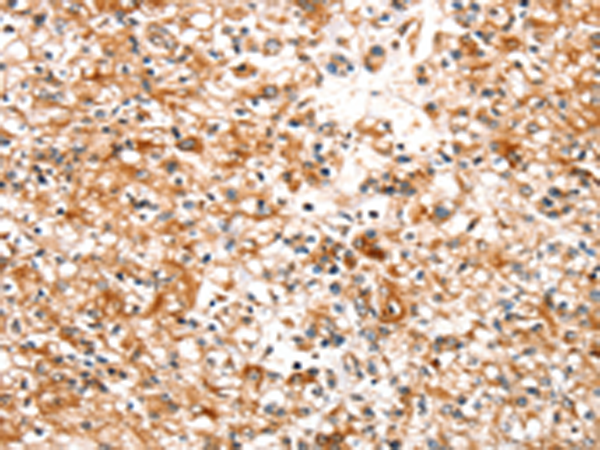

| WB | 咨询技术 | Human,Mouse,Rat |
| IF | 咨询技术 | Human,Mouse,Rat |
| IHC | 1/25-1/100 | Human,Mouse,Rat |
| ICC | 技术咨询 | Human,Mouse,Rat |
| FCM | 咨询技术 | Human,Mouse,Rat |
| Elisa | 1/1000-1/2000 | Human,Mouse,Rat |
| Aliases | AGC1; ARALAR |
| Host/Isotype | Rabbit IgG |
| Antibody Type | Primary antibody |
| Storage | Store at 4°C short term. Aliquot and store at -20°C long term. Avoid freeze/thaw cycles. |
| Species Reactivity | Human, Mouse |
| Immunogen | Synthetic peptide of human SLC25A12 |
| Formulation | Purified antibody in PBS with 0.05% sodium azide and 50% glycerol. |
+ +
以下是关于SLC25A12抗体的3篇参考文献示例(文献信息及摘要概括):
1. **文献名称**:*Molecular identification of the mitochondrial aspartate/glutamate carrier in human neural cells*
**作者**:Palmieri, L., et al.
**摘要**:该研究通过制备针对SLC25A12蛋白的特异性抗体,验证了其在人类神经细胞线粒体中的表达,并证明其在天冬氨酸/谷氨酸转运中的关键作用。
2. **文献名称**:*Linkage and association of the mitochondrial aspartate/glutamate carrier gene (SLC25A12) with autism*
**作者**:Ramoz, N., et al.
**摘要**:利用SLC25A12抗体检测自闭症患者脑组织样本,发现该蛋白表达异常可能与自闭症发病机制相关,支持基因关联分析结果。
3. **文献名称**:*Functional characterization of the mitochondrial aspartate/glutamate carrier isoforms*
**作者**:Fiermonte, G., et al.
**摘要**:通过Western blot和免疫荧光(使用SLC25A12特异性抗体),揭示了不同组织中线粒体天冬氨酸/谷氨酸载体亚型的分布差异及其代谢功能。
4. **文献名称**:*Tissue-specific variations in SLC25A12 subcellular localization*
**作者**:Thierrin-Montalbetti, C., et al.
**摘要**:采用SLC25A12抗体进行亚细胞定位分析,发现该蛋白在不同细胞类型中线粒体膜上的动态分布,提示其功能多样性。
(注:以上文献为示例,实际引用时需核对具体来源及内容准确性。)
The SLC25A12 gene encodes the mitochondrial aspartate/glutamate carrier protein Aralar1 (AGC1), a member of the solute carrier family 25 (SLC25) responsible for transporting metabolites across mitochondrial membranes. This calcium-binding carrier plays a critical role in the malate-aspartate shuttle, facilitating the exchange of aspartate from the mitochondrial matrix with glutamate and protons from the cytosol. It is essential for maintaining cellular energy metabolism, urea cycle function, and neurotransmitter synthesis, particularly in the central nervous system.
Antibodies targeting SLC25A12 are widely used to study its expression, localization, and function in various tissues, especially in neurological and metabolic research. They enable detection of the protein via techniques like Western blotting, immunohistochemistry, and immunofluorescence. Given SLC25A12's association with neurodevelopmental disorders, including autism spectrum disorder (ASD) and epileptic encephalopathy, these antibodies are valuable tools for investigating disease mechanisms.
Most commercial SLC25A12 antibodies are raised against specific epitopes, such as the N-terminal or C-terminal regions, and validated for reactivity in human, mouse, or rat samples. Researchers frequently employ them to examine protein expression changes in disease models or to confirm CRISPR/Cas9-mediated gene editing. Proper validation using knockout controls is critical due to potential cross-reactivity with related carriers like SLC25A13 (Aralar2). Studies often focus on its role in mitochondrial dysfunction and neuronal development.
×